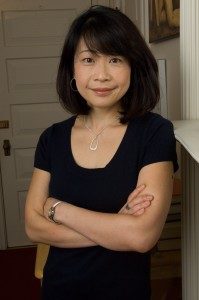
Last September, Clark University’s Higgins School of Humanities was awarded a $600,000 grant from the Andrew W. Mellon Foundation following a complex, sometimes grueling application process successfully executed by a team of faculty and staff. Associate Professor of English Betsy Huang spent over a year on the project, and was excited about turning her full attention to teaching and research once the good news was delivered.
Clark had other ideas.
This past summer, President David Angel appointed Huang to the new position of Chief Officer of Diversity and Inclusion. In this half-time post, Huang will oversee a series of initiatives to boost the University’s diversity profile among faculty, students and staff.
The creation of the position was recommended in a report published last year by the Diversity Task Force, which found that Clark needs to adopt a proactive approach to attracting more minority candidates to the faculty ranks, and to establish an atmosphere of inclusion for the entire Clark community. The University’s track record in these areas is best characterized as one of “benign neglect,” the report states.
“The overall arc of that record is that we keep trying and keep failing,” Huang says. “This is not to say our institution is dysfunctional, but our more intentional efforts toward diversity and inclusion, for one reason or another, never seemed to gain traction.”
That is changing. Since her appointment, Huang has been working with faculty members, the administration and Human Resources on measures to address the fact that Clark falls below regional and national averages in faculty diversity, particularly among African American and Latino/a groups. The goal is to increase minority representation within Clark classrooms and labs by introducing new processes and mechanisms that will allow the University to tap into a broader candidate pool as it recruits, hires, and retains faculty members. For instance, a “diversity advocate” will now be a part of each faculty search committee. The advocate will work with Huang to reconceive the search process — from the selection criteria through the interview and campus visit — to widen the applicant base.
The hiring process will balance affirmative action with equal opportunity, she notes, by acknowledging the need for minority and underrepresented applicants for faculty positions, and then ensuring that all candidates are given equal consideration.
“Diversity is critical since we are a university with a faculty governance system — faculty are the primary role models for students,” Huang says. “When we increase the number of minorities on the faculty, it has a positive implication on the recruiting and retention of faculty of color and the recruiting and retention of students of color. The sense of diversity as the norm rather than as an outlier becomes part of the institution’s DNA.”
Clark will also work to create a more accommodating environment for minority and underrepresented students.
“At predominantly white institutions, students of color face social challenges that sometimes affect academic performance, so we want to have resources and support structures in place to ensure that they feel welcome and participatory, and that their voices are heard,” Huang says. This means collaborating with Student Affairs units and student organizations to foster inclusive environments, not just for ALANA (African, Latina/o, Asian and Native American) students, but also for LGBTQ (Lesbian, Gay, Bisexual, Transgender, and Queer), international — indeed, all student communities. “We want to make sure that all students have the visibility and voice to determine the culture of Clark.”
Staff, too, deserve respect and representation, she says, with an appreciation that the workplace is truly a “shared place.” Huang aims to have more staff represented “at some tables of governance” at Clark.
Now in her 11th year at Clark University, Huang says her new position meshes well with her scholarly research into representations of ethnic identities and politics in 20th and 21st century American literature and popular culture. That pursuit, in turn, fits with her desire “to perform a service for the University.”
“This has brought together two important aspects of my life: my scholarly research and my citizenship as part of Clark,” she says.
The Office of Diversity and Inclusion will work in tandem with two committees: the Committee on Diversity and Inclusion (CDI) and the Committee on Campus Climate (CCC): the former will address conceptual and structural changes to cultivate diversity and the latter will provide assessment and monitoring.
Huang will bring her message on the road when she speaks to ALANA alumni on Jan. 30 in Boston, and March 18 in New York City. For more information visit Clark Connect or email alumni@clarku.edu.
She notes that the University’s commitment to diversity and inclusion is a solid first step toward eradicating the “benign neglect” label and enacting tangible change.
“At Clark, we want to be good at owning up to what we do well and what we do not do well,” she says. “Now that there is validation from President Angel that this is a legitimate issue to talk about, we can convert that talk into action.”
